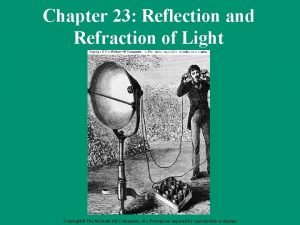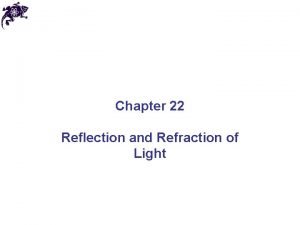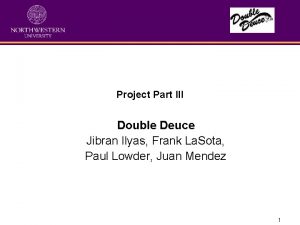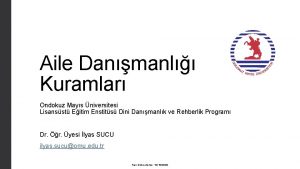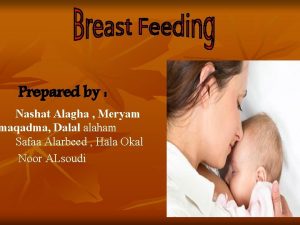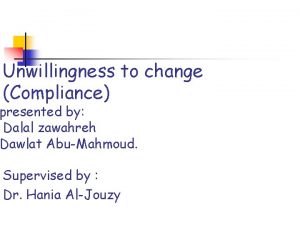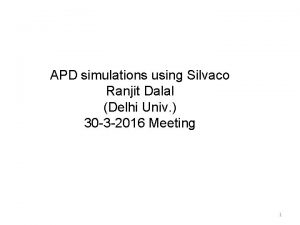Marriag e Moulana Ilyas Dalal In the Light



![Marriage [Nikaah] In Islam • Nikaah is a great form of ibadat in Islam. Marriage [Nikaah] In Islam • Nikaah is a great form of ibadat in Islam.](https://slidetodoc.com/presentation_image_h/a1d71dd7b13c8d885332097ef2842d21/image-4.jpg)






























- Slides: 34

Marriag e Moulana Ilyas Dalal In the Light of Qur’aan & Sunnah

In contrast to other religions, which consider ‘celibacy’ as a great virtue and a means of salvation, Islam considers marriage as one of the most virtuous and approved institutions. The importance of marriage receives its greatest emphasis from the Qur’aan and Sunnah.

‘Pre. Marriage’
![Marriage Nikaah In Islam Nikaah is a great form of ibadat in Islam Marriage [Nikaah] In Islam • Nikaah is a great form of ibadat in Islam.](https://slidetodoc.com/presentation_image_h/a1d71dd7b13c8d885332097ef2842d21/image-4.jpg)
Marriage [Nikaah] In Islam • Nikaah is a great form of ibadat in Islam. Nabie-e-Karim (saw) has referred to it as “half of Imaan”. • Islam considers marriage a social obligation, an act which is greatly admired by Allah. It is a natural relationship between man and woman.

“And among His signs is this, that he created for you mates from among yourselves, that you may dwell in tranquillity with them, and He has put love and mercy between your hearts. Verily in that are signs for those who reflect”. (Surah Roum) “And we sent Messengers before you, and appointed for them wives and children”. (Surah Raad)

VIRTUES OF NIKAAH • “If any person performs nikaah, he has completed half of his religion. To fulfil the other half of his Deen (religion) he should fear Allah”. (Mishkaat) • “Nikaah (marriage) is among my ways”. • “O youth, those of you who can support a wife should marry because this will be a means of keeping your gazes lowered and a protection from your private parts. And those amongst you who are not capable of should fast for fasting will lower ones passion”.

Meaning of the Word Nikaah • Literally Nikaah means to “join”. Technically, Nikaah is a contract between a male and female which permits the authority of matrimonial relations. • The status of Nikaah in Shariah The ruling of performing Nikaah will differ with individual persons. For some it will be Fardh (compulsory), and for some it may be Waajib while for some it will be Sunnah and there may be instances when marriage will be Makrooh Tahrimi.

The Pre-requisites of Nikaah The fundamental requirement of Nikaah is: a) To make a proposal (ijaab) (b) Aacceptance (qabul) Proposal means for one partner (male or female) to ask the other of getting married to him/her. Acceptance means for the other partner to accept this request. Once the proposal is made, acceptance must be done using the words in the past tense. e. g. “I propose to you in my nikaah” the reply should be “I have accepted you in my nikaah”. Words in the present or future tense do not confirm the proposal.

Components of an Islamic Nikaah 1. Consent of the girl verbally or in writing or through her representative 2. Declaration and Acceptance. 3. Two witnesses. (Muslims, mature and sane) 4. Mehr (dowry) 5. Muharamaat. The Nikaah cannot be made with any of the Mahaarim, (those categories of males and females with whom one cannot marry).

There Are Seven Causes of Prohibition in Shariah 1. Prohibition due to blood relations. 2. The wife`s or husband`s family (in laws) 3. Prohibition due to foster relations. Foster relations are established when babies are breastfed by another woman. (foster relations are established only if the baby was weaned/suckled during the first two years of breastfeeding) 4. Prohibition due to religious difference. 5. Prohibition due to species similarity. i. e. same sex marriages

6. Prohibition due an irrevocable divorce 7. Prohibition due to close related women being in one person`s marriage. a) To make Nikaah with two sisters at the same time. b) To make Nikaah with aunt and niece at the same time. c) To make Nikaah with mother and daughter at the same time.

Guidelines for Choosing a Marriage Partner “Every item of this world is (an item) of benefit. However, the item of most benefit is a pious wife. ” (Mishkaat) “ Women are married for four qualities, some are married for wealth, some for the family(lineage) status, some for beauty and some for the Deen (piety). Marry a woman for her Deen and you shall be happy/successful. ” (Mishkaat)

What to Do When One Decides to Make Nikaah 1. To find the best and most pious women. According to the Shariah it is permissible to see the girl. 2. To make istikharah. 3. To take members of one`s family to propose. 4. To keep making dua to Allah to guide one and to give one the correct partner. 5. The proposal should be submitted to the Wali (guardian) of the girl.

What One Is Not Allowed to Do 1. To date and court the woman before Nikaah. 2. To phone each other. 3. To go out shopping and on holidays together. 4. To send a proposal to a divorcee/widow during her iddat. 5. To propose to a woman in the state of Ihraam. 6. To submit a proposal when someone else has already proposed to the same woman. Rasoolullah (sallallahu alayhi wa sallam) has stopped us from doing this.

The Rules of Taking Consent • A mature girl has the choice to marry or not to marry. She can marry whomsoever she wishes – no one can force her to marry a particular person. If she marries a person on her own, the Nikaah will be valid irrespective of whether the Wali is informed or not and whether the Wali gives his consent or not

MEHR (DOWRY) Mehr is the wealth which is given by the groom to the bride in lieu for her Nikaah by which the husband gains his matrimonial rights. Mehr is Wajib (compulsory). Even if it is not mentioned at the time of Nikaah one will still be obliged to pay. There is no maximum limit, however a light Mehr has been praised highly by The Prophet (saw) HADEETH “The best of women is one who is beautiful and her dowery is very little. ” “Rasoolullah (sallallahu alayhi wa sallam) made Nikaah with some of his wives for as little as ten Dirhams. ” Umar (radhiyallahu anhu) disliked and stopped people from taking huge amounts for Mehr.

The Different Types of Mehr 1. Mehr-e-muaj`jal (with an Ayn) ‘prompt dowry’ which is given immediately upon marriage. 2. Mehr-e-muej`jal (with an hamza) ‘Deferred dowry’ (which is delayed to a specified or unspecified time)

3. Mehr-e-Faatimi (r. a. ) the type of dowery which Hadhrat Ali (r. a. ) gave to Hadhrat Fatima (r. a. ) At the time of marriage. The dowry was four hundred “mithqals” of silver which equates to 1530. 9 grams or between £ 400 -£ 450 (according to the value of silver). 4. Mehr-e-mithl (family dowry) i. e. Mehr given according to the women of the fathers family. This Mehr is formed with thirteen things in common.

RULES OF MEHR • 1. The Mehr is one of the fundamental conditions of Nikaah. • 2. The amount agreed for Mehr should be mentioned at the time of Nikaah. • 3. The money used for Mehr should be from one`s Halaal wealth. • 4. There should be no delay in giving of the Mehr. It is best to give it on the day of Nikaah.

• 5. If the husband refuses to give the Mehr on the demand of his wife, she has the right to stop all matrimonial relations. • 6. It is unlawful and incorrect for the husband not to give the Mehr, or to intend not to give her the Mehr. • 7. The Mehr should not be less than ten Dirhams or 30. 618 grams (£ 10 -£ 15). • 8. If a woman is married for less than ten Dirhams, then in this case ten Dirhams will be Waajib because Mehr cannot be less than this amount.

Duties of a Parent and Guardian • “The one to whom a child is born should give a good name to the child and train him with good character and when he is matured to get him married. If he did not get him married and the boy commits a sin the sin will be upon the father”.

Not to Delay in Three Things • We are instructed not to delay in three things: Salaah, Janaazah and Nikaah. What to do after receiving a proposal. • “When one of you receives a proposal from such a person with whose Deen (piety) and character you are pleased then marry him/her to the person, and if you reject it there will be widespread corruption on earth” (Tirmidhi)

• “Announce your Nikaah and perform them in the Masjid”. (This is done to inform the public and to avoid doubt. • It is Mustahab to distribute dates. • Islam prohibits one from being extravagant. Therefore splashing money on a big hall, elaborate decorations etc. are all contrary to the teachings of Islam. • There is absolutely no permissibility of music. The Holy Prophet has said “Listening to music and singing is sinful and to sit in its gathering is Fisq (transgression) and taking enjoyment from it is Kufr”

‘Post. Marriage’

WALEEMAH – Post Marital Feast • The walimah should be simple and according to one`s means. • One can invite family and friends. • Islam strictly prohibits mixed gatherings. • The intention of waleemah is to follow the Sunnah. • The waleemah should not be like the feasts of the Non-Muslims.

• One should not refuse an invitation to a walimah if the laws of Shariah are not contravened. “When you are invited for a walimah then you should go. ” (Mishkaat). • “The worst of food is that which is served in as walimah where only the rich are invited and the poor are left out. Whosoever declines an invitation (without legitimate reason), has acted contrary to the command of Allah and His Messenger (saw)”. (Ma’arariful Hadeeth, pg 34, vol 7) • When the Prophet (saw) married Hadhrat Zainab (ra) walimah was made with meat and bread and with Hadhrat Saffiyah (ra) the food cloth was laid on which were some dates, cheese and melted butter.

• Waleemah is offered by the new husband, and is an act of virtue as well as a display of appreciation towards the new wife and her family. • Waleemah has been emphasised by the Prophet (saw) as a time of happiness. “For this nemat, one must express shukr (gratefulness) – Waleemah is this demonstration…” (Ma’arariful Hadeeth, pg 34, vol 7)

The Duties After Nikaah • 1. The Mehr • 2. Maintenance. In Shariah it is Waajib for the husband to provide his wife with: food, clothes and shelter(living quarters/home) • HOME The husband must provide living quarters for his wife according to their financial means. • The living quarters must be such that no other relative of the husband lives there, whereby the couple can live without any constraints.

• 3. It is waajib for the husband to live in harmony and to treat his wife at all times justly and to please her. • If a person has more than one wife, he will have to treat each one equally. “Whoever has two wives and inclines (unfairly) to the one over the other, he will come forth on the day of judgement with one side being lame. ” (Tirmidhi). • 4. It is waajib for the husband to give his wife taleem (education) of Deen.

Some Advice The Prophet (saw) was sent as a model for all classes of men even those worldly men who live with wives and children. He brought a complete change, in the status and position of women. Equality became the regulating principle of the married parties, and the ideal of wifehood was declared to be love and affection and not subordination. • The Qur’aan says, “treat them (wife) kindly”

• The husband should not his wife as this will create bitter feelings. The Prophet (saw) discouraged hitting by saying, “the best of you is he who is best to his wife”, and further said, “never hit your partner like the hitting of your slave”. • The Qur’aan says, “men are caretakers of women”. • The Prophet (saw) also encouraged spending on one’s wife and family besides food, clothes and abode, “the best a man spends is what he spends on his family”, this will be considered as a charitable act. • The Prophet (saw) said, “the Mu’min with the most perfect Iman is one who has best character and who is kindest to his wife”

Polygamy (Having More Than One Wife At One Time) • “Marry women of your choice, two, three or four; but if you fear that you shall not be able to deal justly (with them), then only one, or that which your right hand possess. That will be more suitable, to prevent you from doing injustice. ” (Surah Nisaa verse 3) • The Quranic verse regarding polygamy was revealed immediately after the battle of Uhud, wherein many orphans and widows were left destitute.

The Ruling • It is necessary to make Nikaah to one wife only when one fears that one is unable to fulfil the rights of more than one wife. • The Quran gives permission to marrying a maximum of four wives at one time. • One does not need to take permission of the first wife in order to marry the second wife.

Other Presentation’s On the Subject of ‘Marriage’ § Family Life – Pregnancy; Childbirth (Islamic Customs); and the Upbringing (tarbiyyah) of Children § Divorce (Talaaq)
 Ccc big data
Ccc big data Light light light chapter 23
Light light light chapter 23 Light light light chapter 22
Light light light chapter 22 Light light light chapter 22
Light light light chapter 22 Jibran ilyas
Jibran ilyas Ilyas neal
Ilyas neal Ilyas çiçekli
Ilyas çiçekli Rumus perhitungan tenaga perawat menurut depkes
Rumus perhitungan tenaga perawat menurut depkes Ilyas sucu omü
Ilyas sucu omü Maulana ilyas
Maulana ilyas Ilyas çiçekli
Ilyas çiçekli Dr.ilyas
Dr.ilyas Ilyas haouam
Ilyas haouam This materials blocks light
This materials blocks light Put out the light then put out the light
Put out the light then put out the light Bouncing off of light
Bouncing off of light Membrane-bound organelles
Membrane-bound organelles Chúa sống lại
Chúa sống lại Hổ đẻ mỗi lứa mấy con
Hổ đẻ mỗi lứa mấy con đại từ thay thế
đại từ thay thế Diễn thế sinh thái là
Diễn thế sinh thái là Vẽ hình chiếu vuông góc của vật thể sau
Vẽ hình chiếu vuông góc của vật thể sau 101012 bằng
101012 bằng Cong thức tính động năng
Cong thức tính động năng Thế nào là mạng điện lắp đặt kiểu nổi
Thế nào là mạng điện lắp đặt kiểu nổi Tỉ lệ cơ thể trẻ em
Tỉ lệ cơ thể trẻ em Lời thề hippocrates
Lời thề hippocrates Vẽ hình chiếu đứng bằng cạnh của vật thể
Vẽ hình chiếu đứng bằng cạnh của vật thể Quá trình desamine hóa có thể tạo ra
Quá trình desamine hóa có thể tạo ra Môn thể thao bắt đầu bằng từ chạy
Môn thể thao bắt đầu bằng từ chạy Hát kết hợp bộ gõ cơ thể
Hát kết hợp bộ gõ cơ thể Khi nào hổ mẹ dạy hổ con săn mồi
Khi nào hổ mẹ dạy hổ con săn mồi Các loại đột biến cấu trúc nhiễm sắc thể
Các loại đột biến cấu trúc nhiễm sắc thể Biện pháp chống mỏi cơ
Biện pháp chống mỏi cơ Trời xanh đây là của chúng ta thể thơ
Trời xanh đây là của chúng ta thể thơ

